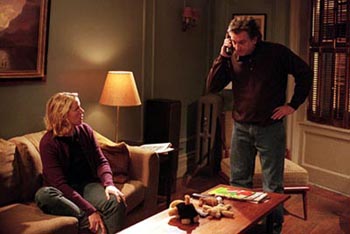![[Metroactive Movies]](/movies/gifs/movies468.gif)
[ Movies Index | Show Times | Silicon Valley | Metroactive Home | Archives ]
Throwback
Robert De Niro goes on autopilot for 'City by the Sea'
By Richard von Busack
EVERYONE LOVES the Hitchcock quote about how film is life with the boring parts cut out. Unfortunately, much of the machinery of the average police movie counts as those boring parts. Michael Caton-Jones' City by the Sea is a melodrama about a Manhattan police detective, Vincent LaMarca (Robert De Niro), forced to hunt for his estranged son, Joey (James Franco), after Joey murders a drug dealer. De Niro's Vincent is doubly guilty--not just because he abandoned his son years earlier, but also because the cop fears the secret of his own parentage: Vincent's father was a kidnapper, executed decades earlier in the electric chair.
On the run from police and dealers alike, Joey hides out in the spectacularly decrepit town of Long Beach, N.Y., where the father and son used to live together. The locations are the ruins of Asbury Park, N.J. (See this, and you'll realize why Bruce Springsteen is so solemn.) The atmosphere of waste and decay keeps you initially fascinated, and Frances McDormand is excellent as Vincent's lover in an off-again, on-again sleepover friendship. McDormand makes the thin part live through accent marks: her pauses, her direct look at a man trying to avoid her eyes. But waves of phoniness beat against the plot. Patti LuPone is painfully theatrical as Vincent's ex; on the boardwalk, a criminal named "Snake" runs into a criminal named "Spyder" (William Peterson) and so forth.
Scriptwriter Ken Hixon, of San Francisco's ACT, sourced this film from the 1997 Esquire article by the late Pulitzer Prize-winning journalist Mike McAlary. Some changes were budgetary (the story is kept in New York, when, in real life, Joey sensibly fled for Texas). Some were in the name of sympathy (the real Joey was a manic-depressive premeditated murderer). McAlary's hook was his supposition that a "criminal gene" in the LaMarca family had bypassed a generation, striking after going through a cop. He used the word "atavism" to describe Joey's turning to crime. McAlary, an ex-sports writer, bolstered this hunch by citing the "baseball gene" that passed from Ken Griffey the elder to the younger. If you follow this argument to its logical conclusion, it suggests there are genetic criminals. So then, you ask, what eugenic measures should be used to sterilize their parents?
This kind of mad logic, danced around in McAlary's hard-boiled article, would seem to be too clearly exposed in a film. That's why the producers rejiggered this De Niro vehicle with boring parts: the kid going bad because his dad wasn't there; Vincent getting a second chance through a cute foundling that arrives on his doorstep; the father/son bonding session set against the final police standoff (the cops almost say, "Come on out of there, Dutch! We got the warehouse surrounded!"). In pleading for his son's love and forgiveness, De Niro abandons the raw, inside-out method acting that he favored as one of Brando's generation; he's regressed to precise, Golden-age autopilot acting. Now, that's atavism for you.
[ Silicon Valley | Metroactive Home | Archives ]
![]()

Can You Hear Me Now? Robert De Niro phones in his part in 'City by the Sea' while Frances McDormand pines for the Coen brothers.
City By The Sea (R; 108 min.), directed by Michael Caton-Jones, written by Ken Hixon, based on an article by Michael McAlary, photographed by Karl Walter Lindenlaun and starring Robert De Niro, Frances McDormand and James Franco, opens Friday at selected theaters valleywide.
Send a letter to the editor about this story to letters@metronews.com.
From the September 5-11, 2002 issue of Metro, Silicon Valley's Weekly Newspaper.